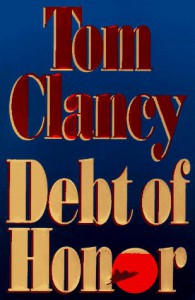The legacy of Clancy's fantasies of war

Back in the 1990s, one of the authors I really enjoyed was Tom Clancy. His novels offered entertaining descriptions of hypothetical clashes between the great powers of the world. most of them involving his alter ego Jack Ryan, the kind of person Clancy wanted to be (and later, John Clark, alter ego Clancy really wanted to be). My love for his books ended with Executive Orders, however, which, while offering the sort of simplistic "the way things would be if I were in charge" developments that are commonplace nowadays among novels self-published on Amazon by guys arming up against black helicopters and other fever dreams of the "guv'm'nt" taking away their guns, also painted Ryan into a corner plot-wise -- now that Ryan was the center of power, his opportunity for action was effectively zero. Because of this, Debt of Honor became for me the last "decent" Clancy novel. I remembered it being a rather creative staging of a hypothetical conflict between the United States and a clique of resurgent Japanese nationalists who had co-opted the Japanese government, one that I had enjoyed when it came out but hadn't re-read since.
Then I came across a community copy that I decided to revisit. And rereading it made me furious.
Reading it again with the benefit of hindsight and the experience of having read dozens of better novel since then didn't help, as the two-dimensional caricatures that pass for Clancy's "characters" were even more evident than before. The jingoism also grated more, though this I am willing to put down to the time in which it was written, with the U.S. as the lone superpower and the rest of the friendly world still willing to defer to our leadership. What I realized for the first time as I reread it, though, was the antiseptic nature of the "wars" Clancy stages for his readers. In this novel, Japan effectively declares war against the United States by the none-too-imaginative route of what amounts to a second Pearl Harbor,
(show spoiler). Men do die as a result, but the deaths consist of a lot of off-page events that provide outrage without the bloodshed. Then the United States strikes back, and it has all of the horror of an arcade game with targets (mostly planes and ships) being popped off by the good guys. In the end, what amounts to World War III is over in a matter of months, with less disruption to the two nations than what might be caused by a soccer riot.
I doubt that any of this would have occurred to me when I first read Clancy's book two decades ago, but it seems positively glaring given what has happened since then. We now know from experience that wars are not great conflicts of state that can be waged with minimal loss and resolved with little fuss. Yet we still have armchair warriors today who read novels like Clancy's and think that all it takes to fix America's problems is a little martial action and the white hats will send the black hats running. That such fantasies still persist is a dubious testament to the power of Clancy's appeal, and it may well serve as the most lasting legacy of his work.
 6
6






